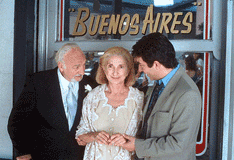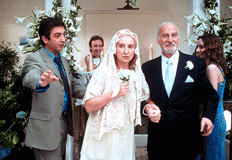The Son of the Bride (Juan Jose Campanella) 2002
 Itís not terribly surprising that Argentinean Juan Jose
Campanellaís The Son of the Bride
was nominated for a Best Foreign Film Oscar by the same Academy that dubbed the
mediocre feel-good drivel A Beautiful Mind
Best Picture, but it is somewhat disappointing. A perfect example of rancid,
well-intentioned, but shamelessly manipulative movie making, the filmís
horrible premise, in which an overly sentimental old codger with too much time
on his hands subjects his Alzheimerís-stricken wife to a second wedding,
pushes the limits of good taste under the pretext of good intentions. By
comparison to this travesty, Iris, the
Judi Dench senility weepie, looks like an exercise in restraint. Perhaps, in
South America thereís a different perspective toward the mentally ill, but to
my American sensibilities, the ordeal that they intend to put Norma, the bride
of the title, through seem entirely sadistic.
Itís not terribly surprising that Argentinean Juan Jose
Campanellaís The Son of the Bride
was nominated for a Best Foreign Film Oscar by the same Academy that dubbed the
mediocre feel-good drivel A Beautiful Mind
Best Picture, but it is somewhat disappointing. A perfect example of rancid,
well-intentioned, but shamelessly manipulative movie making, the filmís
horrible premise, in which an overly sentimental old codger with too much time
on his hands subjects his Alzheimerís-stricken wife to a second wedding,
pushes the limits of good taste under the pretext of good intentions. By
comparison to this travesty, Iris, the
Judi Dench senility weepie, looks like an exercise in restraint. Perhaps, in
South America thereís a different perspective toward the mentally ill, but to
my American sensibilities, the ordeal that they intend to put Norma, the bride
of the title, through seem entirely sadistic.
 Certainly some of the filmís bad taste springs from the
lack of definition given to either Norma or the other charactersí memories of
her. Conflicting information arises, comparing her sometimes to a saint and
sometimes to an overbearing harpy, and in her current state, weíre unable to
make any sort of judgment of her. The movie shamelessly mines laughs out of her
senility, repeatedly showing her as she curses like a sailor in public places.
This alone is absolutely cringe-worthy, but when coupled with the movieís
tendency to have her snap into a state of coherence so she can smile whenever
the film needs a heart touching moment, it becomes unbearable. It doesnít help
much that the rest of the cast seems to be composed of self-delusional,
self-involved jerks. The movie expects us to pity their bad behavior early on so
we can be moved by their cathartic journey toward enlightenment, but I never
could get over how self-centered they were in the first place.
Certainly some of the filmís bad taste springs from the
lack of definition given to either Norma or the other charactersí memories of
her. Conflicting information arises, comparing her sometimes to a saint and
sometimes to an overbearing harpy, and in her current state, weíre unable to
make any sort of judgment of her. The movie shamelessly mines laughs out of her
senility, repeatedly showing her as she curses like a sailor in public places.
This alone is absolutely cringe-worthy, but when coupled with the movieís
tendency to have her snap into a state of coherence so she can smile whenever
the film needs a heart touching moment, it becomes unbearable. It doesnít help
much that the rest of the cast seems to be composed of self-delusional,
self-involved jerks. The movie expects us to pity their bad behavior early on so
we can be moved by their cathartic journey toward enlightenment, but I never
could get over how self-centered they were in the first place.
For all of my complaints against The Son of the Bride, I can recognize that itís competently, if
anonymously made, and certainly the acting is better than average (with the
exception of the protagonistís best friend, who seems to be Benigni-lite).
Still, these concessions donít really deter my extreme unease with the
filmís premise nor its utter lack of subtlety. Perhaps itís appropriate on
some level that a film that so unashamedly distorts the sickness of senility to
its own ends also requires the audience to shut off their brains to eke any
enjoyment out of it. For those unable, or unwilling, to do that simply to be
moved, it offers little.
*
3/26/02
Jeremy Heilman